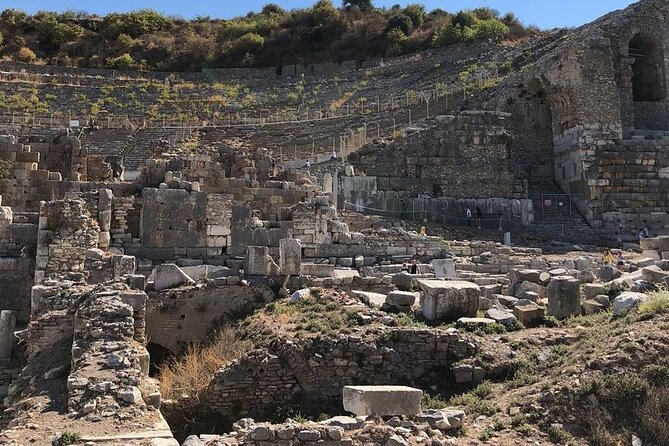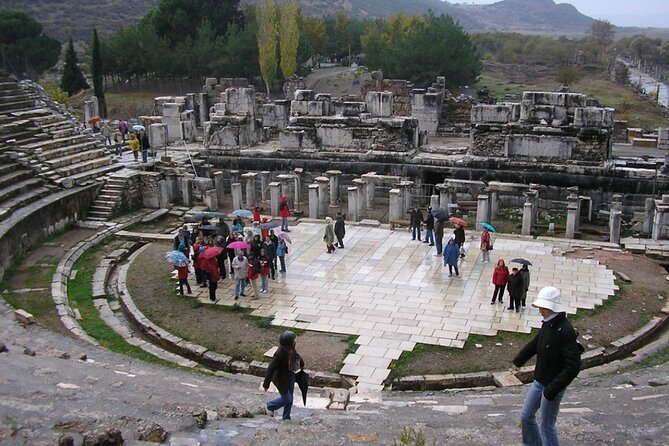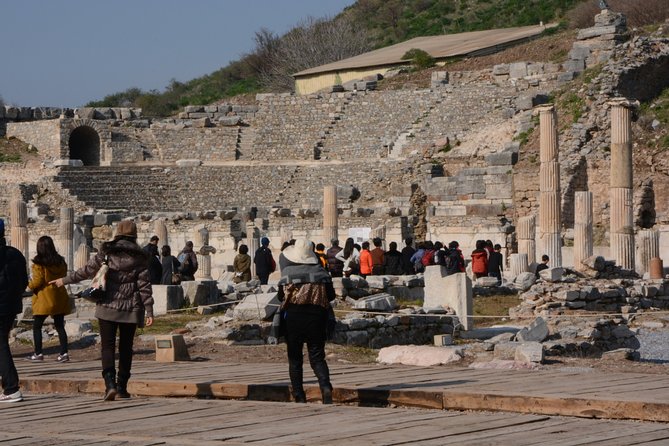Biblical Jewels of Ephesus
As the sun casts its gentle glow upon the ancient stones of Ephesus, each one seems to whisper secrets of a time long past, beckoning visitors to uncover the Biblical Jewels of this mystical land.
The intertwining of history and faith creates a tapestry that captivates the curious and the reverent alike. From the hallowed grounds of the Temple of Artemis to the echoes of St. Paul’s teachings, Ephesus stands as a testament to the enduring legacy of biblical narratives.
A journey through this sacred site promises to reveal not just artifacts but a deeper connection to the spiritual essence that permeates every corner.
Key Points

- Ephesus boasts significant biblical landmarks like the Temple of Hadrian and the House of Mother Mary.
- The city’s religious artifacts and artwork offer valuable insights into past beliefs and practices.
- Spiritual practices and rituals in Ephesus reflect a blend of cultural and religious traditions.
- Archaeological discoveries in Ephesus reveal its rich history, craftsmanship, and societal structures.
Historical Significance of Ephesus

Located on the western coast of Turkey, Ephesus holds tremendous historical significance as one of the most well-preserved ancient cities in the Mediterranean region. Its importance lies in its influence as a major center of trade, culture, and spirituality during ancient times.
Ephesus was a hub for activities ranging from commerce to religious practices, making it a pivotal city in the ancient world. The city’s strategic location allowed it to flourish and attract diverse populations, contributing to its rich tapestry of culture and heritage.
Ephesus’s significance can be seen in its well-preserved structures, such as the Library of Celsus and the Great Theatre, which stand as testaments to its past glory and influence in shaping the history of the region.
Notable Biblical Landmarks
Exploring the ancient city of Ephesus unveils a collection of notable Biblical landmarks that offer profound insights into the region’s religious history and significance. The city is home to several key biblical sites that attract visitors seeking pilgrimage experiences. Among these landmarks are the Temple of Hadrian, where travelers can witness the architectural grandeur of ancient times.
Plus, the House of Mother Mary holds deep religious significance as the place where Mary is believed to have spent her final years. Another remarkable site is the Seven Sleepers Cave, a location linked to a well-known Christian legend. These landmarks not only offer historical value but also provide a spiritual journey for those exploring Ephesus.
Religious Artifacts and Artwork

Unveiling the rich tapestry of Ephesus, visitors are captivated by the intricate religious artifacts and artwork that adorn the ancient city, offering a glimpse into the spiritual legacy of the region. Ephesus boasts a collection of religious artifacts that includes ancient pottery, sculptures, and inscriptions showcasing the beliefs and practices of its inhabitants. Among the iconic artwork found in Ephesus are stunning mosaics depicting scenes from mythology and daily life, intricate frescoes adorning the walls of temples and homes, and statues honoring various deities. These artifacts and artworks not only serve as a window into the past but also highlight the artistic and religious significance of Ephesus in antiquity.
| Religious Artifacts | Iconic Artwork | Cultural Significance |
|---|---|---|
| Ancient pottery | Mythological mosaics | Preservation of beliefs |
| Inscriptions | Temple frescoes | Artistic expression |
| Sculptures | Deity statues | Historical importance |
Spiritual Practices and Rituals

Spiritual practices and rituals in Ephesus offer a profound insight into the daily lives and beliefs of its ancient inhabitants. They reveal a sacred tapestry woven with devotion and tradition.
Spiritual ceremonies held in Ephesus were deeply intertwined with the community’s traditional beliefs, reflecting a blend of cultural practices and religious customs. These rituals often involved prayers, offerings, and symbolic gestures that sought to honor the divine and maintain spiritual harmony within the society.
The people of Ephesus engaged in these ceremonies with reverence and dedication, considering them essential for connecting with the divine forces believed to govern their lives. Through these practices, the ancient Ephesians expressed their faith, sought blessings for their endeavors, and reinforced their spiritual bonds with one another.
Archaeological Discoveries Uncovered

The ancient city of Ephesus has yielded remarkable archaeological discoveries that shed light on its rich history and vibrant civilization. Archaeological findings in Ephesus have uncovered a treasure trove of historical artifacts, including intricate mosaics, well-preserved statues, and ancient coins. Excavation techniques such as stratigraphy and ground-penetrating radar have been instrumental in uncovering these treasures buried beneath the layers of time. These discoveries not only showcase the advanced craftsmanship and architectural prowess of the ancient Ephesians but also provide valuable insights into their daily lives, beliefs, and societal structures. The meticulous excavation efforts continue to reveal new findings, painting a vivid picture of the city’s past and its significance in the ancient world.
| Artifacts | Excavation Techniques | Significance |
|---|---|---|
| Mosaics | Stratigraphy | Revealing daily life |
| Statues | Ground-penetrating radar | Uncovering religious practices |
| Coins | Carbon dating | Understanding trade routes |
Cultural Influence on Ephesus
Ephesus showcases a blend of cultural influences that have shaped its vibrant history and architectural heritage over the centuries.
-
Roman Influence: The Romans established Ephesus as a major port city and contributed to its urban development.
-
Greek Heritage: With its origins as an ancient Greek city, Ephesus displays a rich cultural tapestry influenced by Greek architecture and traditions.
-
Christian Legacy: The presence of religious artifacts, such as the House of the Virgin Mary, highlights Ephesus’ significance in early Christianity.
These cultural influences intertwine to create a unique atmosphere, where visitors can witness the layers of history that have shaped Ephesus into the fascinating destination it’s today.
Impact of Biblical Events
With its historical significance deeply rooted in biblical events, Ephesus stands as a living testament to the enduring impact of religious narratives on the city’s cultural landscape.
The biblical significance of Ephesus is profound, with the city mentioned multiple times in the New Testament. It was home to one of the Seven Churches of Revelation, the Ephesian church, and was visited by prominent figures like the Apostle Paul.
The historical context of Ephesus intertwines seamlessly with its religious connections, making it a site of spiritual impact for many believers.
The presence of landmarks like the Temple of Artemis and the House of the Virgin Mary further solidifies Ephesus as a place where biblical events have left an indelible mark on both its past and present.
Modern-Day Relevance and Interpretations
Exploring the modern-day significance and varied interpretations of Ephesus reveals a dynamic tapestry of historical, cultural, and religious influences intertwined in its ancient walls.
-
Interpretation Insights:
- Scholars debate the meanings behind the Ephesus ruins, from religious symbolism to architectural significance.
- Different perspectives shed light on the multifaceted history of Ephesus and its relevance in contemporary discourse.
- Understanding the interpretations allows for a richer appreciation of the site’s complexity and legacy.
-
Contemporary Connections:
- Ephesus serves as a focal point for discussions on ancient civilizations, trade routes, and urban planning.
- The site’s preservation efforts highlight the importance of historical conservation and cultural heritage.
- Tourists and pilgrims alike find spiritual and educational value in Ephesus, bridging the past with the present.
Common questions
Are There Any Specific Restrictions or Dress Codes to Keep in Mind When Visiting the Religious Sites in Ephesus?
When visiting religious sites in Ephesus, travelers should observe cultural etiquette and wear appropriate religious attire. Respect site regulations by covering shoulders and knees. Avoid hats inside religious buildings. Follow these tips for a respectful experience.
Is There a Recommended Time of Day to Visit the Ephesus Ruins to Avoid Crowds and Fully Experience the Spiritual Atmosphere?
The best time to visit the Ephesus ruins for a spiritual experience and to avoid crowds is early morning or late afternoon. These times offer a serene atmosphere perfect for connecting with the ancient history and energy of the site.
Are There Any Local Customs or Traditions That Visitors Should Be Aware of When Exploring Ephesus With a Guide?
When exploring Ephesus with a guide, visitors should respect local customs and traditional practices. Following etiquette, cultural norms, and dress codes is crucial. Be mindful of site restrictions and listen to visitor tips for an interactive experience.
Can Visitors Participate in Any Interactive Activities or Workshops Related to the Historical and Religious Aspects of Ephesus During the Tour?
Visitors can engage in interactive workshops and enjoy religious experiences during the tour. These activities offer a hands-on approach to understanding the historical and spiritual significance of Ephesus, enhancing the overall journey.
Are There Any Lesser-Known Archaeological Sites or Hidden Gems in Ephesus That Are Not Commonly Included in Standard Tours but Are Worth Exploring for a Deeper Understanding of the Region’s History and Significance?
Exploring Ephesus reveals hidden treasures like the Terrace Houses, showcasing ancient Roman life. Uncovering secrets at the Cave of the Seven Sleepers offers unique insights. These lesser-known sites enrich understanding of Ephesus’ rich history.
Last Words
Set out on a journey through time and explore the enchanting Biblical Jewels of Ephesus with Viator
From ancient temples to sacred caves, each landmark holds a story waiting to be discovered.
Enjoy the rich history, artifacts, and spiritual practices of this iconic site.
With entrance fees included and a fresh lunch provided, this guided tour offers an unforgettable experience that will leave you with a profound sense of awe and reverence.